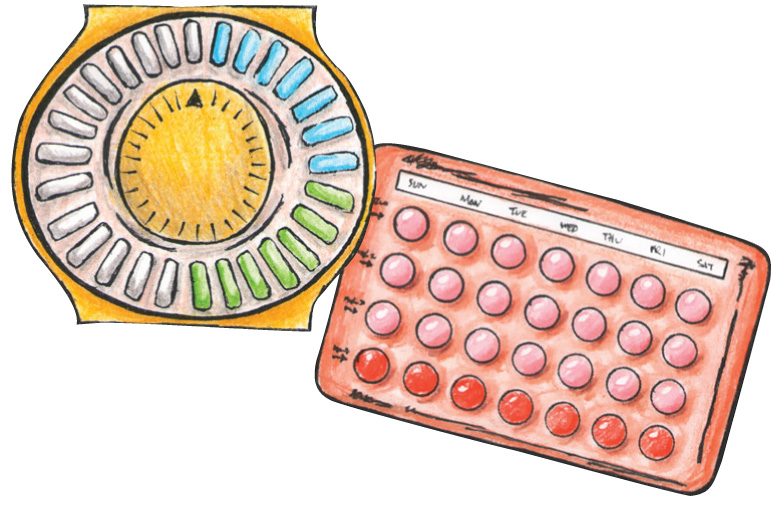Sex-Ed in Egypt is pretty much non-existent; schools don't include classes in the curriculum, leaving the birds & the bees lesson to the parents, and the parents would rather you figure it out on your wedding night.
So it's no wonder really that the population is so high-- no one really explained that you can get pregnant without even being penetrated, or even when you're not currently ovulating. And how many women complain about sex not being pleasurable? Who taught them how it could be?
All in all, there's loads Egyptian women need to know about their reproductive systems-- here are the top 16:
You MUST pee after sex
Sex is basically a free-for-all for bacteria. If it gets close enough to the urethera, which is not far off (more on that later), it can travel all the way up to the bladder and cause tissue damage and infection. This results in a painful urinary tract infection (UTI) which requires antibiotics to treat.

Douches create problems, instead of fixing them
Using a vaginal douche liquid changes the necessary balance of the vaginal flora (i.e. good bacteria) and natural pH (i.e. acidity). This increases the risk of harmful bacteria entering the vagina, which can lead to many problems, such as excessive dryness, a rash, or a yeast infection.
The vagina is magically self-cleaning, so the most you should be doing is rinsing the outer labia with water during your shower. And while you're in the shower, put down the soap! The chemicals that make your soap bar or shower gel smell nice irritate your sensitive parts.
If you're worried about your eau de vag, it could be diet-related or perhaps an indicator of a health problem, so you might want to consult a gynecologist.

You can get pregnant any day of the year
The whole 'safe period' method of avoiding pregnancy is BS. Sperm can live in a woman's body for up to five days. So even if you think you're good to go because your ovulation phase is over, the sperm can still fertilize your ova (i.e. eggs). That is, you can get pregnant even when you're not ovulating. It's even possible to get pregnant if you have sex while on your period. The only surefire way to prevent pregnancy is through birth control.

There's no point in taking a pregnancy test 'the morning after'
An at-home pregnancy test won't show accurate results until two weeks after conception or the first day after a missed period. If you want to know a little bit sooner, you can get a blood test done-- they can detect hCG (pregnancy hormone) within 7-12 days of conception.

Tampons don't break your hymen
First of all, it's important to note that your hymen isn't like a sheet of plastic wrap covering the entire circumference of the vagina; there's actually on opening, or in some cases more than one. Think about it-- how would you have a period flow if the hymen was blocking it?
So, when you insert a tampon, there are three possible things that can happen:
1- Most likely the tampon will pass through without breaking your hymen
2- Your hymen will stretch to allow the tampon to pass through
3- Unlikely scenario: Your hymen covers more of your vaginal opening than ordinary and tears when you insert a tampon
You may not even have a hymen-- some women were born without one. Also, vigorous exercises-- such as horseback riding or martial arts --can stretch or 'break' hymen tissue.
In some *very* rare cases, the hymen is 'imperforate' (i.e. completely closed), which can cause a number of complications.

You can miss your period even if you're not sexually active
Extreme weight loss or weight gain can interfere with your menstrual cycle, as can chronic stress. Women with a low body mass index (BMI)-- that is, those severely underweight --are very likely to not have a period.
Even travel has an effect on your 'time of the month'!
However, if you are still experiencing PMS and pain without bleeding, you may have Polycystic Ovary Syndrome (PCOS) and should see a doctor.

The pill can reduce your risk of cancer
In 1992, an analysis of 20 studies found that the longer a woman used birth control pills the more her risk of ovarian and endometrial cancer decreased; one year of using the pill resulted in a 10-12% decrease, and five years of use decreased their chances and by approximately 50%.
If you have a history of breast cancer in your mother's family, however, consult a gynecologist before starting the pill, as some studies have shown it can slightly increase your chances of developing the disease.

You can strengthen/tighten your vagina with exercise
The vagina is a muscle just like any other, and needs exercised. 'How on earth do you do *that* ?' Kegels.
Have you ever tried 'pausing' while you pee, stopping the flow? That right there is kegel exercise. Kegels strengthen the pelvic floor muscles, which support the uterus, bladder, small intestine and rectum. It's as simple as contracting the muscles 'down there'; tighten your pelvic floor muscles, hold the contraction for five seconds, and then relax for five seconds-- try it four or five times in a row. Still not sure how to do it? Pretend you're holding in a fart.
Bonus: this is something you can do any time, like while watching TV or in the car-- no one can actually see you doing it because kegels only move things inside the body, not outside.
Not all labia look the same
If you were under the impression that all women look alike down there, well, you're mistaken. Think about it-- we all have different noses, don't we? Why should labia be any different?

You don't actually pee from your vagina
Pee comes out of your urethra, which is a tiny hole located between the clitoris and labia minora (i.e. vaginal opening).

If your PMS makes you excessively anxious or 'depressed', you may have PMDD
Pretty much all women experience cramping, mood swings, and a crazy colon during PMS. However, if you find that your period makes you depressed and/or anxious to the point where it interferes with your life, you may have Premenstual Dysmorphic Disorder (PMDD). Consult a gynecologist and get a hormonal blood test done-- there's a solution for PMDD!

You can get birth control inserted into your arm
There are about 7 types of common birth control methods: the pill, NuvaRing, Depo-Provera shot, diaphragm, IUD, the patch, and..... the implant! Nexplanon and Implanon are implants the size of a cardboard match stick, which are inserted underneath the skin of the upper arm. This method of birth control lasts up to three years!

Periods are not just blood
The 'blood' released during your period mainly consists of the uterine lining, cells from the mucus lining of the vagina, bacteria and some blood. Have you ever wondered why it doesn't form a scab, though? Unlike regular blood, period 'blood' doesn't contain the three elements necessary for coagulation (forming a clot/scab), which is why it remains liquid.
You could get pregnant without having penetrative sex
Sperm has one job, and that is to find an egg and fertilize it. Because of this, they can travel far and fast. So if semen gets close enough to the vaginal opening (say, on your lower stomach, or on your inner leg), it can travel (invisibly!) into the vaginal canal and up through the cervix. So the 'pulling out' method isn't the best idea if you're trying to avoid pregnancy. One ejaculation can contain 40 million and 1.2 billion sperm. So, yeah, you can get pregnant without the ejaculation happening inside you.

Women rarely orgasm vaginally
If the G-spot is stimulated, sure, maybe it will induce orgasm. However, the most successful way to get the job done, is by stimulating the clitoris. Everyone is different though, so what works for one woman will differ from the next.

The duration of your period can indicate fertility
The length of your cycle can indicate hormonal imbalances and ovulation issues.
If your entire cycle is less than 21 days, it is likely that ovulation did not occur-- meaning you are less likely to become pregnant. If it lasts more than 35 days, then ovulation either didn't occur, or is occurring irregularly, which also effects chances of conception. A normal menstrual cycle is between 21-35 days.
If your period lasts more than seven days, this can also be a sign that ovulation might not have occurred, or alternatively, there may be something disrupting the uterine lining.

Know thyself.
__________
By Salma Anderson







